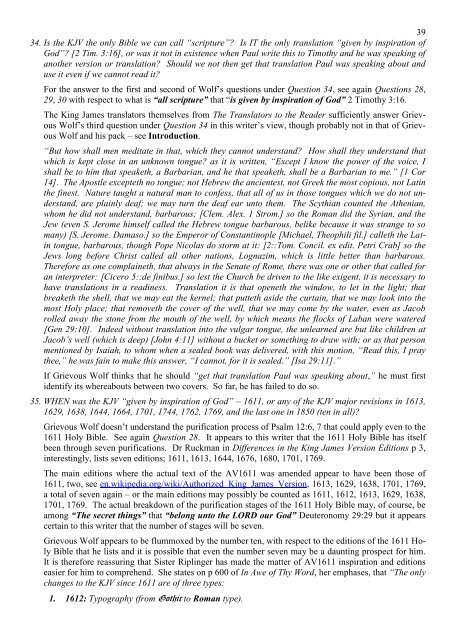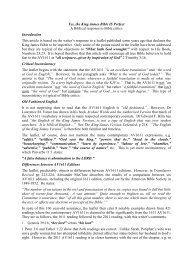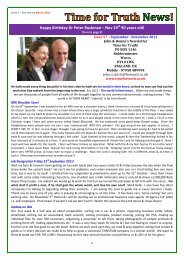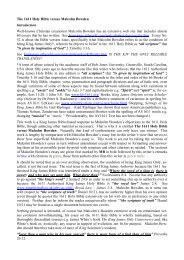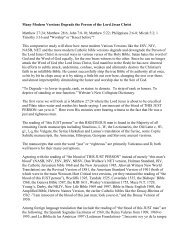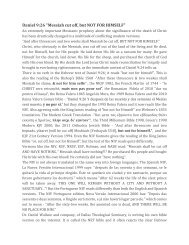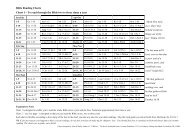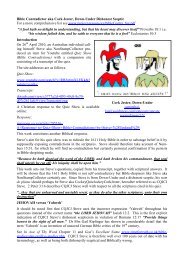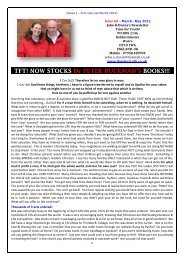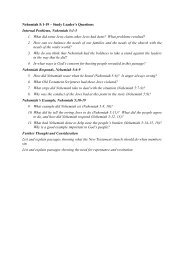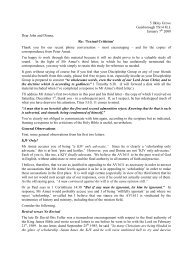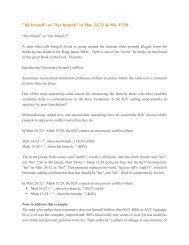A Grievous Wolf - Time for Truth
A Grievous Wolf - Time for Truth
A Grievous Wolf - Time for Truth
Create successful ePaper yourself
Turn your PDF publications into a flip-book with our unique Google optimized e-Paper software.
39<br />
34. Is the KJV the only Bible we can call “scripture”? Is IT the only translation “given by inspiration of<br />
God”? [2 Tim. 3:16], or was it not in existence when Paul write this to Timothy and he was speaking of<br />
another version or translation? Should we not then get that translation Paul was speaking about and<br />
use it even if we cannot read it?<br />
For the answer to the first and second of <strong>Wolf</strong>’s questions under Question 34, see again Questions 28,<br />
29, 30 with respect to what is “all scripture” that “is given by inspiration of God” 2 Timothy 3:16.<br />
The King James translators themselves from The Translators to the Reader sufficiently answer <strong>Grievous</strong><br />
<strong>Wolf</strong>’s third question under Question 34 in this writer’s view, though probably not in that of <strong>Grievous</strong><br />
<strong>Wolf</strong> and his pack – see Introduction.<br />
“But how shall men meditate in that, which they cannot understand? How shall they understand that<br />
which is kept close in an unknown tongue? as it is written, “Except I know the power of the voice, I<br />
shall be to him that speaketh, a Barbarian, and he that speaketh, shall be a Barbarian to me.” [1 Cor<br />
14]. The Apostle excepteth no tongue; not Hebrew the ancientest, not Greek the most copious, not Latin<br />
the finest. Nature taught a natural man to confess, that all of us in those tongues which we do not understand,<br />
are plainly deaf; we may turn the deaf ear unto them. The Scythian counted the Athenian,<br />
whom he did not understand, barbarous; [Clem. Alex. 1 Strom.] so the Roman did the Syrian, and the<br />
Jew (even S. Jerome himself called the Hebrew tongue barbarous, belike because it was strange to so<br />
many) [S. Jerome. Damaso.] so the Emperor of Constantinople [Michael, Theophili fil.] calleth the Latin<br />
tongue, barbarous, though Pope Nicolas do storm at it: [2::Tom. Concil. ex edit. Petri Crab] so the<br />
Jews long be<strong>for</strong>e Christ called all other nations, Lognazim, which is little better than barbarous.<br />
There<strong>for</strong>e as one complaineth, that always in the Senate of Rome, there was one or other that called <strong>for</strong><br />
an interpreter: [Cicero 5::de finibus.] so lest the Church be driven to the like exigent, it is necessary to<br />
have translations in a readiness. Translation it is that openeth the window, to let in the light; that<br />
breaketh the shell, that we may eat the kernel; that putteth aside the curtain, that we may look into the<br />
most Holy place; that removeth the cover of the well, that we may come by the water, even as Jacob<br />
rolled away the stone from the mouth of the well, by which means the flocks of Laban were watered<br />
[Gen 29:10]. Indeed without translation into the vulgar tongue, the unlearned are but like children at<br />
Jacob’s well (which is deep) [John 4:11] without a bucket or something to draw with; or as that person<br />
mentioned by Isaiah, to whom when a sealed book was delivered, with this motion, “Read this, I pray<br />
thee,” he was fain to make this answer, “I cannot, <strong>for</strong> it is sealed.” [Isa 29:11].”<br />
If <strong>Grievous</strong> <strong>Wolf</strong> thinks that he should “get that translation Paul was speaking about,” he must first<br />
identify its whereabouts between two covers. So far, he has failed to do so.<br />
35. WHEN was the KJV “given by inspiration of God” – 1611, or any of the KJV major revisions in 1613,<br />
1629, 1638, 1644, 1664, 1701, 1744, 1762, 1769, and the last one in 1850 (ten in all)?<br />
<strong>Grievous</strong> <strong>Wolf</strong> doesn’t understand the purification process of Psalm 12:6, 7 that could apply even to the<br />
1611 Holy Bible. See again Question 28. It appears to this writer that the 1611 Holy Bible has itself<br />
been through seven purifications. Dr Ruckman in Differences in the King James Version Editions p 3,<br />
interestingly, lists seven editions; 1611, 1613, 1644, 1676, 1680, 1701, 1769.<br />
The main editions where the actual text of the AV1611 was amended appear to have been those of<br />
1611, two, see en.wikipedia.org/wiki/Authorized_King_James_Version, 1613, 1629, 1638, 1701, 1769,<br />
a total of seven again – or the main editions may possibly be counted as 1611, 1612, 1613, 1629, 1638,<br />
1701, 1769. The actual breakdown of the purification stages of the 1611 Holy Bible may, of course, be<br />
among “The secret things” that “belong unto the LORD our God” Deuteronomy 29:29 but it appears<br />
certain to this writer that the number of stages will be seven.<br />
<strong>Grievous</strong> <strong>Wolf</strong> appears to be flummoxed by the number ten, with respect to the editions of the 1611 Holy<br />
Bible that he lists and it is possible that even the number seven may be a daunting prospect <strong>for</strong> him.<br />
It is there<strong>for</strong>e reassuring that Sister Riplinger has made the matter of AV1611 inspiration and editions<br />
easier <strong>for</strong> him to comprehend. She states on p 600 of In Awe of Thy Word, her emphases, that “The only<br />
changes to the KJV since 1611 are of three types:<br />
1. 1612: Typography (from Gothic to Roman type).


